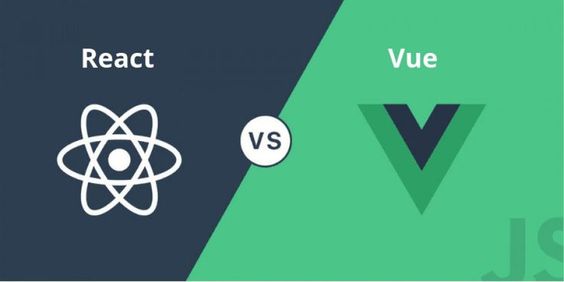Blog
Vue vs. React:Which Framework is Best for Your Web App?
Explore the differences between Vue and React frameworks to determine the best choice for your web app. Learn about their features, pros, cons, and ideal use cases in this in-depth comparison.
Read Time:
7 minutes
Published:
October 28, 2024
Vue vs. React: Which Framework is Best for Your Web App?
In the development sector, we frequently experiment with various technologies, delving into their intricate details as part of our daily work. With the rapid evolution of new technical advancements, it can be overwhelming to keep up.
Companies are continually finding innovative ways to transform their projects into successful products. As a developer or business owner, your responsibility now extends beyond merely assembling a skilled development team; you also need to choose the right technology stack for your project.
We’re here to simplify that process for you.
Today, we’ll explore and compare two of the most widely used JavaScript frameworks you might find yourself debating between React and Vue.
When building web applications, Vue.js and React.js stand out as top contenders. Understanding their differences can help you choose the right one for your project. We will dive into what each framework offers and discuss their benefits, similarities, differences, and use cases. This way, you can make a smart choice in the Vue vs. React comparison.
Get Your Custom React JS Application Solution from WebuildX
What is Vue.js?
Vue.js is a progressive JavaScript framework created by Evan You in 2014. It was designed to be adaptable, allowing developers to adopt it incrementally. This means you can integrate Vue into existing projects without needing to rewrite everything from scratch.
Benefits of Vue.js
Ease of Use: Vue’s straightforward syntax is user-friendly, making it a great choice for beginners. Its design allows developers to quickly pick up the framework and start building.
Flexible Integration: You can easily incorporate Vue into projects of various sizes, whether it is a small widget or a large-scale application.
Rich Ecosystem: With a wide array of plugins and libraries, Vue offers plenty of options for extending its functionality.
Strong Community Support: For developers who are just starting out or even old-timers, Vue has a large community and database that provides a wealth of resources, tutorials, and plugins to help them navigate challenges.
Reactive Data Binding: Vue’s reactive data binding system makes managing and syncing data between components easy, enhancing performance.
What is React.js?
React is a JavaScript library developed by Facebook, now Meta, in 2013 for building user interfaces, especially single-page applications. Its component-based architecture promotes reusability and maintainability.
Benefits of React.js
JSX Syntax: React uses JSX, a syntax extension that allows HTML-like code to coexist with JavaScript. This makes it easy for developers to visualize the UI structure while coding.
Strong Performance: React’s virtual DOM optimizes rendering, ensuring faster updates and efficient performance.
Mobile Development: With React Native, developers can create mobile applications for both iOS and Android using the same codebase as their web apps.
Large Ecosystem: The vast ecosystem surrounding React includes many libraries and tools that enhance development speed and efficiency.
Popularity: React’s widespread use means that developers can find ample resources, tutorials, and support, making troubleshooting easier.
Vue vs. React: Similarities
When considering React vs. Vue, it is crucial to note that both frameworks share several key similarities:
JavaScript Foundation: Both React and Vue are built using JavaScript, making it easier for developers familiar with the language to adapt.
Component-Based Architecture: They encourage a modular approach to building applications, allowing for better organization and maintainability.
Virtual DOM: Both utilize a virtual DOM to improve performance by minimizing direct interactions with the actual DOM.
Strong Community Support: Each framework has an active community providing resources, tutorials, and plugins, which can be invaluable for developers.
Vue vs. React: Key Differences
While both frameworks offer numerous advantages, the Vue vs. React distinction becomes clear when considering their size, performance, scaling options, and mobile development capabilities. Here are some key differences:
Library vs. Framework: React offers more flexibility and is suited for developers who want to handpick their tools and structure their applications in various ways. On the other hand, Vue provides a more opinionated and cohesive experience, making it easier for developers to get started quickly with essential functionalities included. This can lead to faster development cycles and less time integrating multiple libraries.
Learning Curve: Vue is generally considered easier for beginners, while React’s use of JSX and its more complex concepts can present a steeper learning curve.
State Management: Vue provides Vuex for state management, while React typically relies on external libraries like Redux or the built-in Context API.
Performance: Both frameworks perform well, but React tends to have a slight edge due to its more efficient rendering process.
Ecosystem Size: React has a larger ecosystem with more third-party libraries and tools than Vue.
Flexibility: React allows more flexibility in architecture, while Vue promotes convention over configuration.
Community Size: React has a larger community and more third-party libraries. However, Vue is rapidly gaining popularity.
Use Cases for Vue.js and React.js: Where Each Framework Excels
Identifying specific use cases for Vue and React can greatly influence your choice. Now that we’ve examined React vs. Vue, let us look at where each framework shines:
Use Cases for Vue.js:
Small to Medium Applications: Vue is a perfect fit for small to medium-sized applications, where quick integration and ease of use are paramount.
Single Page Applications (SPAs): Vue’s flexibility makes it a great option for SPAs that require fast and responsive user experiences.
Prototyping: The straightforward nature of Vue allows for rapid prototyping of ideas before scaling them into full applications.
Enterprise Applications: Many businesses choose Vue for enterprise applications due to its modularity and ability to handle complex tasks.
Content Management Systems: Vue is often used in developing CMS where ease of use and flexibility are crucial.
Use Cases for React.js:
Single Page Applications (SPAs): React is widely used for SPAs, delivering fast load times and seamless user experiences.
Large-Scale Applications: React’s component-based architecture makes it suitable for managing complex, large-scale applications.
Mobile Applications: With React Native, developers can create high-performing mobile apps using the same codebase as their web apps.
E-Commerce Sites: The ability to handle dynamic content makes React an excellent choice for e-commerce platforms.
Dashboards and Analytics Tools: React’s flexibility allows for creating sophisticated dashboards that require real-time data updates.
Pros and Cons of Vue vs. React
Understanding the pros and cons of Vue vs. React is crucial for making an informed decision. Here are the strengths and weaknesses of each framework:
Vue.js Pros:
Beginner-Friendly: Easier for newcomers to grasp and start building applications.
Flexible Integration: This can be introduced into projects gradually.
Rich Ecosystem: Plenty of plugins available to enhance functionality.
Excellent Documentation: Well-structured guides and resources.
Reactive Data Handling: Simplifies managing application state.
Well-suited for small projects
Vue.js Cons:
Limited resources compared to React
Less popular in enterprise-level applications
Smaller ecosystem
Fewer large-scale success stories
Less experience in mobile development
Fewer plugins available
React.js Pros:
Extensive ecosystem
High performance with virtual DOM
Component reusability
Strong community and corporate backing
Good for large applications
Popular for mobile development through React Native
React.js Cons:
Steeper learning curve due to JSX
Frequent updates can lead to instability
Boilerplate code can be verbose
It requires a deep understanding of JavaScript
More configuration is needed for state management
Larger library size can affect load times
Looking for Vue.js Development Experts to Join Your Crew?
Which Framework is Better: Vue vs. React?
Deciding between Vue vs. React ultimately depends on your project requirements, team expertise, and long-term goals. Vue might be your best option if you’re looking for ease of use and rapid development. On the other hand, if your project involves large-scale applications with complex requirements and your team is experienced with JavaScript frameworks, React could be the superior choice. Both frameworks have unique advantages, and either can lead to successful web applications when used effectively.
Conclusion: Making the Right Choice Between Vue vs. React
Whether you choose Vue.js or React.js, understanding the nuances of the Vue vs. React comparison will guide you to the best decision for your project. By considering factors like project scale, team expertise, and desired features, you can select the framework that best fits your needs. As web development continues to evolve, staying updated on both frameworks will give you the flexibility to adapt to future trends and innovations.
Loved this article? Share it on social media and follow WebuildX for more insights on web development trends!
writer:
Mmokutimabasi Uttah
Technical Writer
As a technical writer, Mmokutmabasi specialises in breaking down complex topics in web development and emerging tech.
Follow the social media:



